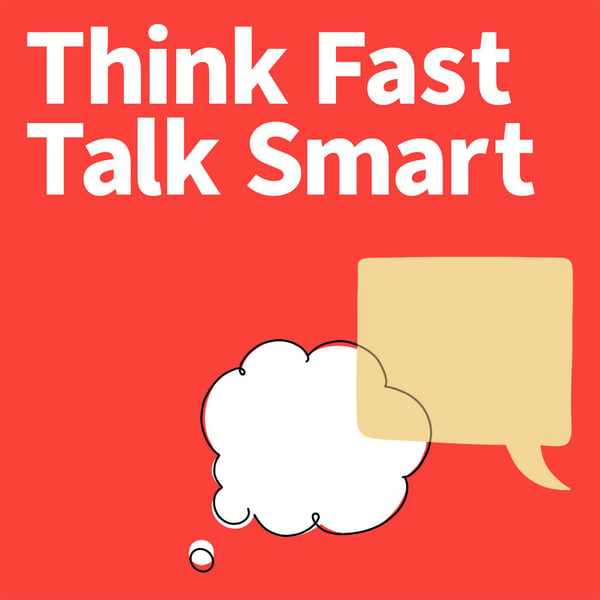214. From Crisis to Clarity: Simplicity, Feedback, and the Art of Being Heard
Think Fast Talk Smart: Communication Techniques
Think Fast Talk Smart
4.7 • 711 Ratings
🗓️ 8 July 2025
⏱️ 24 minutes
🧾️ Download transcript
Summary
How to communicate clearly in any context, from newsrooms to the world stage.
All good communication, whether spoken or written, is built on the same foundation. In everything from police reporting for a newspaper to serving as spokesman for the Pope, Greg Burke has found the key: "Keep it as simple as possible."
Burke has worked as a journalist for Time Magazine and Fox News, as Director of Communications at IESE Business School in Barcelona and Madrid, and even as a communications advisor and spokesman for the Vatican. Across his varied experiences, he’s found that the biggest communication challenges often require the simplest solutions. From expressing “curiosity and real interest” in those we’re speaking with to ensuring our messages are “clear, consistent, and timely,” he advocates for core principles that apply in all types of communication.
In this episode of Think Fast, Talk Smart, Burke and host Matt Abrahams discuss communication strategies that work whether you’re presenting to a team of five or millions of parishioners worldwide. As Burke shares, it’s all very simple: “Know your audience, practice, and have fun.”
To listen to the extended Deep Thinks version of this episode, please visit FasterSmarter.io/premium
Episode Reference Links:
Connect:
- Premium Signup >>>> Think Fast Talk Smart Premium
- Email Questions & Feedback >>> [email protected]
- Episode Transcripts >>> Think Fast Talk Smart Website
- Newsletter Signup + English Language Learning >>> FasterSmarter.io
- Think Fast Talk Smart >>> LinkedIn, Instagram, YouTube
- Matt Abrahams >>> LinkedIn
Chapters:
- (00:00) - Introduction
- (01:56) - Asking Good Questions
- (03:49) - Writing Clearly and Concretely
- (05:28) - Editing and AI’s Role in Writing
- (06:44) - Three Keys to Great Communication
- (08:33) - The Importance of Feedback
- (10:13) - Communication at the Vatican
- (12:57) - Crisis Communication: Lessons from the Vatican
- (15:59) - The Final Three Questions
- (22:40) - Conclusion
*****
This Episode is sponsored by Stanford. Stay Informed on Stanford's world changing research by signing up for the Stanford Report
Support Think Fast Talk Smart by joining TFTS Premium.
Transcript
Click on a timestamp to play from that location
| 0:00.0 | Hi, Matt here. As we start the second half of 2025, I wanted to take a moment to share some things I am super excited about for the show and our Think Fast Talk Smart community. First, we have some amazing influential guests coming up like Dan Harris, Peter Sagal, and Chenaya Boumecay. Second, we've curated several topic-focused playlists like managing speaking anxiety and spontaneous |
| 0:22.8 | speaking, among others. Check them out at faster smarter.io slash playlists. Also, you will notice an |
| 0:30.4 | additional ad or two in our episodes. We're in the process of expanding our team and building out |
| 0:35.4 | our community hub. This requires additional resources. |
| 0:39.1 | We truly appreciate your support and look forward to further helping you deepen and broaden |
| 0:44.0 | your communication and career skills. Please do follow us, rate and review the show, |
| 0:49.3 | and share us with your friends, family, and colleagues. Thank you for listening and for your support. |
| 0:59.8 | Sometimes the biggest communication challenges can be addressed with the simplest of ideas. |
| 1:06.6 | My name is Matt Abraham's, and I teach strategic communication at Stanford Graduate School of |
| 1:11.2 | Business. Welcome to Think Fast, Talk Smart, the podcast. Today I'm excited to speak with my friend |
| 1:18.1 | Greg Burke. Greg worked in a variety of media, newspapers, magazines, wire services, and television, |
| 1:24.8 | including for Time Magazine and Fox News. He also worked in communications at the |
| 1:30.0 | Vatican. He did strategic communication for Pope Benedict and was the spokesperson for Pope Francis. |
| 1:36.3 | Greg is normally shuttling between Madrid and Barcelona, where he teaches public speaking and |
| 1:40.7 | crisis communication at ESA Business School. He's currently a fellow in the Distinguished |
| 1:45.7 | Careers Institute at Stanford. Welcome, Greg. You and I have had lots of fun conversations in the past, |
| 1:51.4 | and I'm glad to have those conversations now on the podcast. Thanks for being here. |
| 1:54.8 | It's great to be here. I've been a big fan of the podcast. We'll be right back, but first, a quick word from our sponsors. |
| 2:04.6 | This episode is brought to you by Stanford University. Stanford researchers are constantly working to improve the world around us. |
| 2:08.6 | Stanford biochemist Lingian Lee has developed drug-like molecules that activate the body's innate immune system to specifically kill cancer cells, |
| 2:18.7 | just like it would kill cells infected by a common cold virus. |
| 2:22.6 | It paves the way for an ultimate cure for cancers that are typically really good at hiding from our immune system, |
... |
Please login to see the full transcript.
Disclaimer: The podcast and artwork embedded on this page are from Think Fast Talk Smart, and are the property of its owner and not affiliated with or endorsed by Tapesearch.
Generated transcripts are the property of Think Fast Talk Smart and are distributed freely under the Fair Use doctrine. Transcripts generated by Tapesearch are not guaranteed to be accurate.
Copyright © Tapesearch 2025.

